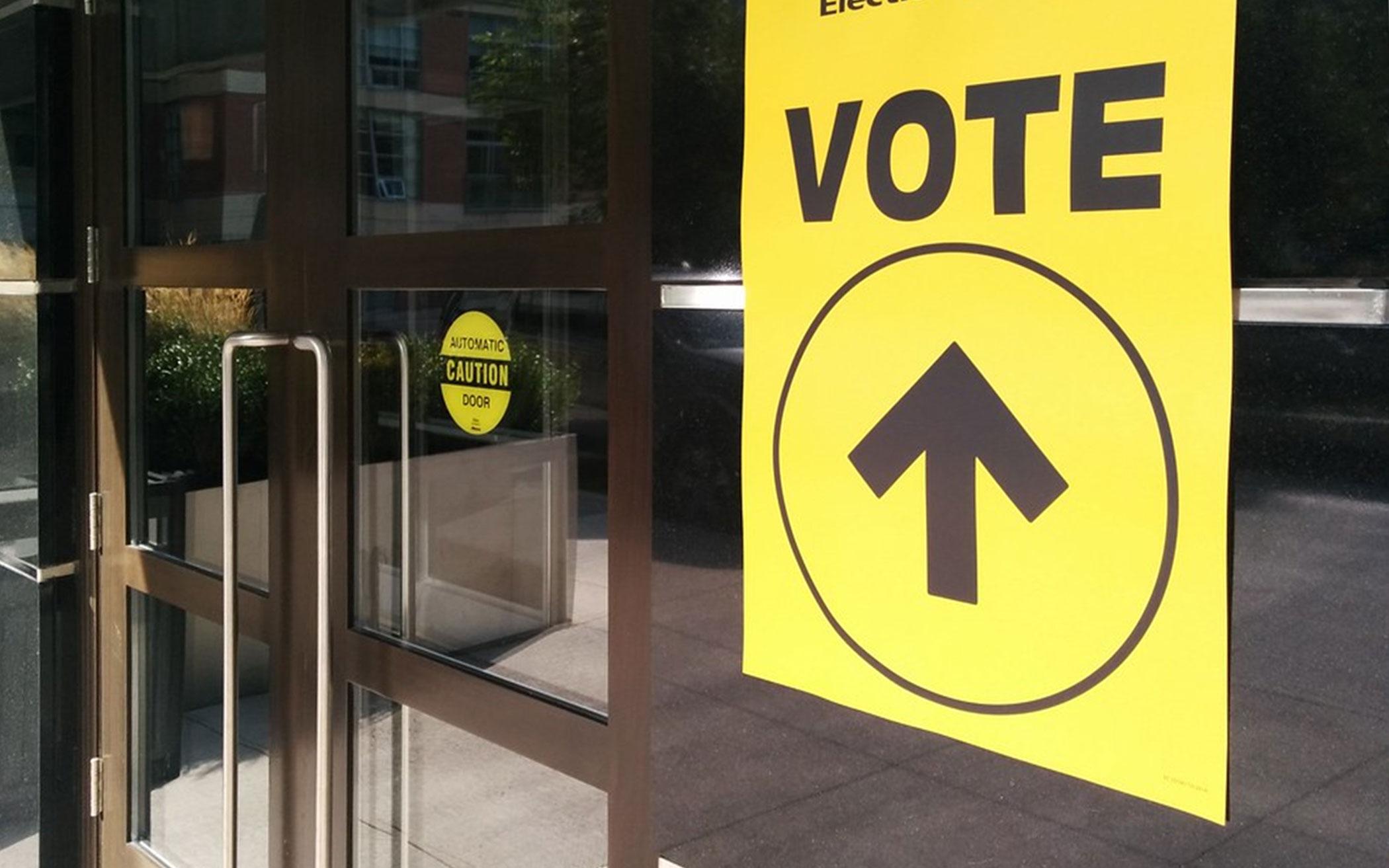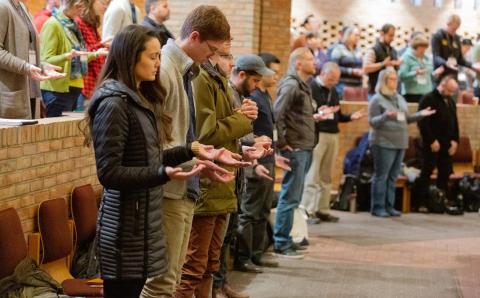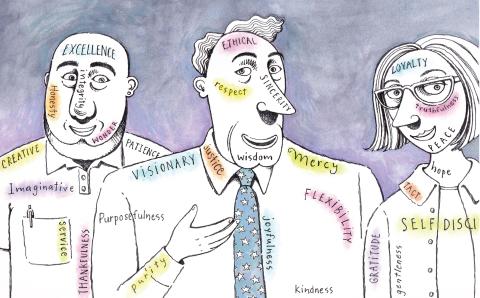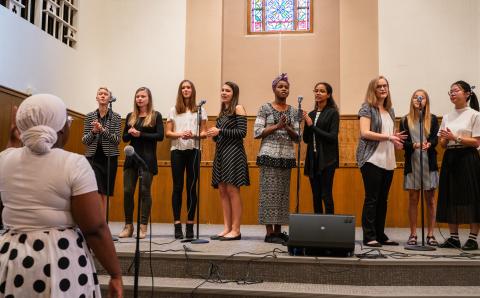It's not easy to know who to vote for at election time. We can be thankful we live in a democracy where we enjoy the right to vote, even if joy might not be what we are feeling as we cast our ballots. So what do we do when we vote? Are we voting for a candidate or group of candidates to govern us? Yes, we are, but there's more to it than that. We are, in fact, voting for people's visions for our community. We are voting for their beliefs about the good life, the public interest, and indeed justice itself.
As it turns out, however, the parties often downplay these visions, focusing narrowly on issues, image and personalities. Yet as Christians we need to dig deeper to find out what motivates our political groupings. If our leaders disagree on the right policies to pursue, it is often because they are effectively worshiping different and conflicting gods. Some form of idolatry is operating within our dominant visions of liberalism, conservatism, and socialism.
Political Idols
So let's take a look at these idols—jealous gods that demand our loyalty and work to influence our political communities. We are familiar with idols in the Bible. Israel's neighbors worshiped tribal deities represented by wood and stone statues. God's people often followed after the same idols the Canaanites, the Philistines, and others served. God raised up prophets to call his people back to faithful worship of the one true God.
Today, our idols are more subtle and come disguised as mere life goals, such as career success, self-esteem, personal fulfilment, and material wealth. By themselves, none of these are bad, of course. Wealth might be a sign of God's blessing, but it comes with the responsibility to use it to serve God and neighbor. A successful career may or may not cap a life well lived, but when we make it the overarching focus of our lives, it becomes an idol.
What does this mean for politics? In North America, we generally see our politicians divided between liberals and conservatives, with socialism increasingly popular among some voters. But what if it turns out that all three represent a form of idolatry distorting our political life?
In Canada, two parties carry the conservative and liberal labels. In the United States, conservatives are generally associated with the Republican Party and liberals with the Democrats, although it hasn't always been like this. Despite the current polarization, both conservatives and liberals follow a larger liberal tradition that influenced the American founding documents in particular. The Declaration of Independence, for example, was penned largely by Thomas Jefferson, who borrowed heavily from the 17th-century English liberal philosopher John Locke.
The Idol of Liberalism
According to this early liberal doctrine, individuals are the building blocks of political community. In the liberal worldview, individuals come together to form a political community to serve their needs. Here they give up some of their liberty as individuals but retain the right to “appeal to heaven,” in Locke's words, by taking up arms against the chief magistrate if he fails to protect their lives, liberty, and property. Jefferson wrote his Declaration to defend the American colonists' struggle to sever their ties with the British Crown, with Locke's language supporting their claims to independence.
The irony is that, in the U.S., and increasingly in Canada, both liberals and conservatives are liberal in the larger sense. Individualism is so persistent a feature of North American political culture that it influences debates over gun control, social welfare, abortion, and marriage. Everyone wants to defend their rights as individuals, but this sometimes gets in the way of other considerations that might otherwise limit people's claims. Because liberalism finds it difficult to recognize the value of these considerations, narrowly focusing on individual interests, liberalism in effect makes the individual into an idol.
In ordinary political life, God calls governments to do public justice, that is, to fairly decide among a variety of legitimate interests, both individual and communal. Although what justice requires is sometimes obvious to everyone, more often, justice requires carefully weighing in the balance the claims of all parties, calling for a judgment not at all obvious to everyone concerned. If individuals and the communities of which they are part come into conflict, sometimes justice leans toward the individual, while at other times it must lean toward the community. Although liberalism is by no means opposed to community, flesh-and-blood liberals believe that in most cases, the claims of individuals should outweigh those of their communities. Canada's Michael Igniatieff, one-time leader of the federal Liberal Party, goes so far as to argue that rights belong only to individuals, to be asserted “against the oppression of religion, state, family, and group” (emphasis mine).
The Conservative Idol
North American Conservatives, while embracing much of the liberal agenda, risk serving an idol in a different way. While actual conservatives differ with each other on many issues, what unites them is respect for tradition. They are not wrong in this. Our very lives and loves are shaped by tradition, which covers virtually everything passed down to us from previous generations. We are more like our parents than we are unlike them, even if we try to distance ourselves from them. Furthermore, those who rebel against one tradition do so by appealing to another tradition, embodying, well, a revolt against tradition! Since the 19th century, the stereotypical revolutionary is immediately identifiable as such, perhaps sporting a black beret and a leather jacket and smoking unfiltered cigarettes. Why? Because this is what the revolutionary traditionally looks like.
Of course, traditions exist in many layers, and we need to consider the possibility that at least some traditions should be discarded. An example is the tradition of legally enforced racial segregation in the southern United States before the 1960s. Others include the casual antisemitism vividly portrayed in Elia Kazan's classic 1947 film, Gentleman's Agreement, and the one-time exclusion of women from a variety of occupations and educational opportunities. To follow tradition thoughtlessly is something the discerning Christian must avoid. Tradition does not speak with one voice, and we do well to follow the 16th-century Reformers in weighing actual traditions in light of God's Word.
Jesus himself had something to say on the status of such traditions in his conflict with the Pharisees and scribes recorded in Matthew 15 and Mark 7. Asked why his disciples had failed to wash their hands before eating, Jesus responded: “And why do you transgress the commandment of God for the sake of your tradition?” (Matthew 15:3.) Indeed, traditions may acquire respectability over many generations but contradict the express will of God in the Bible. Many Christians readily embrace the conservative label in describing their political convictions, but if they immerse themselves in Scripture, they will recognize that traditions as such cannot ultimately be binding. Deferring to tradition, simply because it is tradition, leaves us too passive, limited to reacting to events when they occur, without thinking through the implications of doing so. As Christians, we can do better.
The Idol of Socialism
Finally, there's socialism, the third ideological vision influencing our political landscape. Canadians have been familiar with socialism for many decades, first in the former Co-operative Commonwealth Federation and then, after 1961, in the New Democratic Party. Embodying a unique tradition of democratic socialism, the NDP has never governed Canada as a whole, but it has governed several provinces. In the United States, socialism was until recently considered un-American, often identified with either German immigrants in Milwaukee or Cold War communists. Once the Cold War had ended, with a new generation knowing nothing of this era, socialism unexpectedly became more respectable. During the 2016 presidential election, Vermont Sen. Bernie Sanders successfully mobilized a youthful following for his professed democratic socialism—something that surprised many observers. Now recently elected Rep. Alexandria Ocasio-Cortez is claiming the socialist label as well.
While socialists commendably want to protect the underprivileged, at their most ambitious, they seek to consolidate all types of property ownership into a single communal form, which in practice generally means the state. Socialists are not wrong to value communal ownership of property. In our society, we have no difficulty recognizing that a variety of communities, ranging from families, schools, business enterprises, and church congregations, to local, state/provincial, and federal governments own property. Private ownership is not simply individual ownership, as many libertarians assume. Ownership is dispersed throughout an entire society and takes many forms.
Socialists mistakenly—and unjustly—attempt to concentrate this ownership in the hands of a single community. Single-mindedly pursuing their goal of economic equality, which takes on idolatrous dimensions, they contribute to a dangerous concentration of political power in too few hands. The typical result is a society in which a central government assumes too much responsibility for moving society toward this goal. Socialists are generally impatient with the reality of multiple decision-makers in multiple communities pursuing different goals—something they consider insufficiently egalitarian. Nevertheless, Canadian and American societies are characterized by this huge diversity of agents, both individual and communal.
A Balanced Society
Abraham Kuyper, a 19th-century Christian theologian and politician, recognized this already more than a century ago in Holland when he was working to mobilize those who were not able to vote at the start of his political career. He and his followers fought the efforts of the Dutch liberals to homogenize especially education and to squeeze Christianity out of the public realm, but they did so, not by invoking tradition, but by articulating a positive vision for governance based on the principles of power-sharing across confessional lines and of something called “sphere sovereignty.”
Kuyper, on the one hand, fought against “Uniformity: The Curse of Modern Life” (the title of an address he delivered in 1869), and, on the other, supported confessional orthodoxy against “a false conservatism that adorns itself with the name of Christianity but is devoid of its power” (“Conservatism and Orthodoxy: False and True Preservation,” 1870). (Both addresses can be found in Abraham Kuyper: A Centennial Reader, 1998). Kuyper largely succeeded in finding a place for his Christian followers in the policy process.
Sphere sovereignty means God's authority is granted to human beings and is found in a variety of communities, each of which has a distinctive place in society. Schools are subject to the educational standards and should not be treated as business enterprises. Similarly, the institutional church has its own divine calling that cannot be usurped by another institution. Marriage uniquely unites a man and a woman in a lifelong covenantal relationship supporting the bearing and raising of children. Each sphere in society plays its part, not in isolation from the other, but, one hopes, in a web of cooperative relationships contributing to human flourishing.
Sphere sovereignty does not mean a watertight separation of spheres, as some might see it, but it does imply that God has given a unique commission to each. The result is a balanced society in which no sphere attempts to grasp more than it can rightly claim. This rules out all forms of totalitarianism and a libertarianism expecting too much of the free market.
How to Vote
Sadly, no political party represents this vision in its entirety in North America, even if that vision does correspond more closely to the way actual societies function. Nevertheless, one may find hints of this vision in existing parties, possibly some more than others. When it comes time to vote, many Christians are genuinely puzzled as to who, if any, deserves their vote, given the obvious flaws of the dominating ideological visions. There is no ready answer to this dilemma, and we are often forced to vote for the party and candidate we hope will do the least harm.
When we do vote, let's remember three things. First, because not everyone necessarily come to the same conclusion as to which positive things in a party's program are worthy of support, Christians will inevitably disagree on which party is the least worst of the alternatives. Second, we need to be aware of the distorting ideological visions operating within the party we end up supporting. As we vote for the good things in a particular candidate or party, we will inevitably be stuck with their defects as well. Thus we should go into the polling station with our eyes open. Third and finally, as Christians we must vote prayerfully, asking that God might permit the good to outweigh the bad in any government or administration coming to office.
In the meantime, however we vote, we do well to heed the Apostle Paul and pray “for kings and all who are in high positions, that we may lead a quiet and peaceable life, godly and respectful in every way” (1 Tim. 2:2).
About the Author
David T. Koyzis is author of Political Visions and Illusions (InterVarsity Press, 2019) and We Answer to Another: Authority, Office, and the Image of God (Pickwick, 2014). He holds a Ph.D. in Government and International Studies from the University of Notre Dame. He lives with his family in Hamilton, Ont., Canada.







